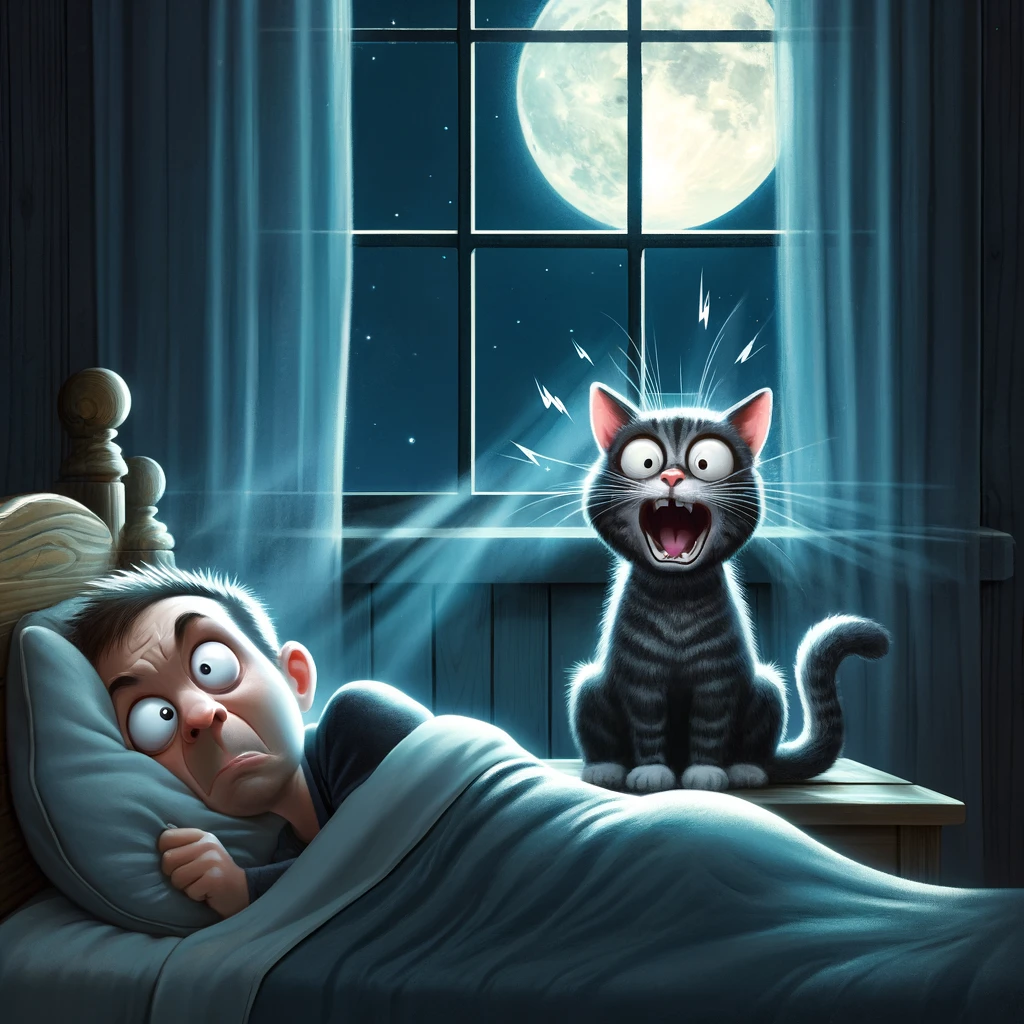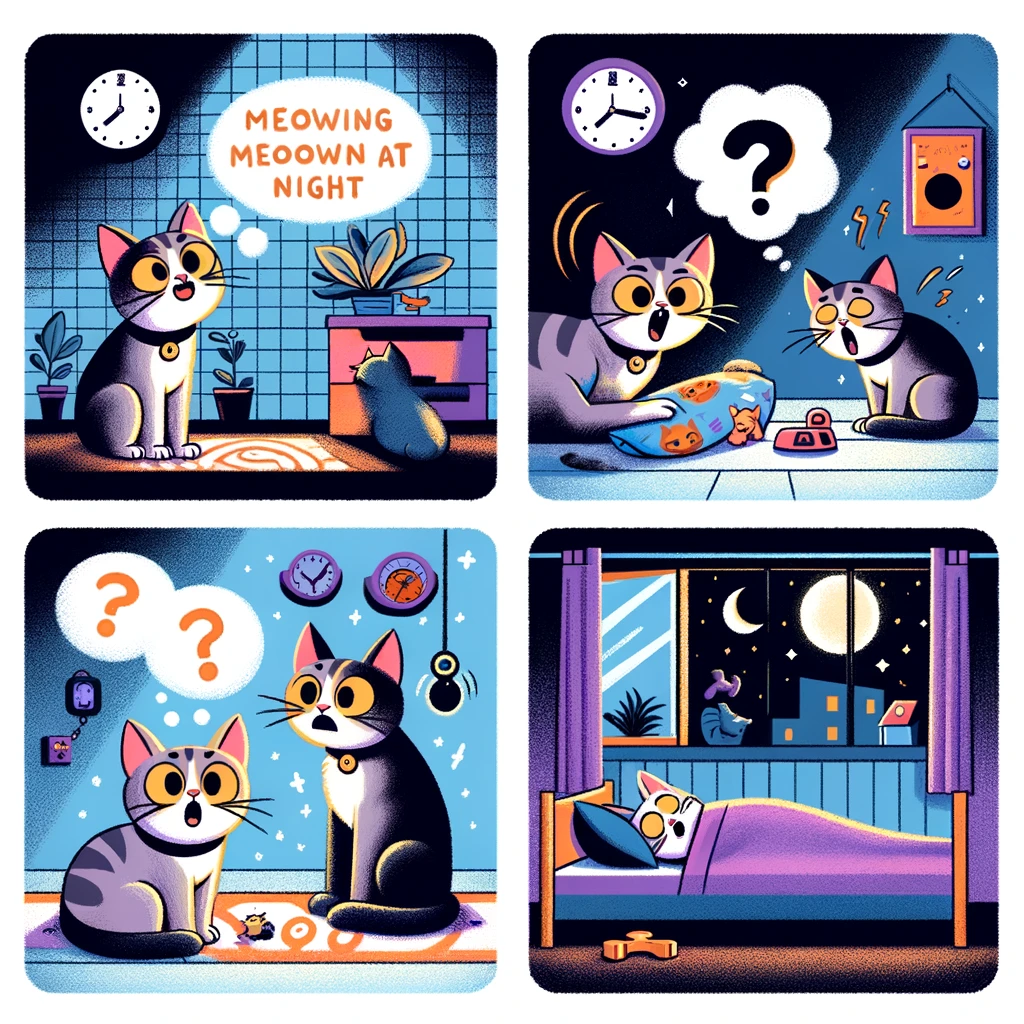Cats are known for their mysterious ways, but one behavior that can puzzle and exhaust pet owners is a cat’s persistent meowing at night. This nocturnal vocalization can disrupt sleep and cause concern. Understanding why your cat meows at night and how to address this behavior is crucial for both your well-being and that of your feline friend.

Why Cats Meow at Night
- Hunger: They might be hungry and asking for food.
- Thirst: Like hunger, a lack of water can lead to nighttime meowing.
- Boredom: Without enough stimulation during the day, cats may become more active and vocal at night.
- Excess Energy: Cats with a lot of pent-up energy may meow as part of their nighttime activities.
- Loneliness: Cats can feel lonely and meow for attention or companionship.
- Anxiety: Stress or anxiety can cause cats to meow more, especially if their environment changes.
- Territorial Disputes: Outdoor cats or even indoor sights and sounds can trigger territorial meowing.
- Mating Calls: Unspayed or unneutered cats may meow due to mating instincts.
- Pain or Discomfort: If a cat is in pain, it may meow to communicate its discomfort.
- Seeking Access: Meowing to gain access to or from certain areas of the home.
- Habit: Some cats develop a habit of meowing at certain times, including nighttime.
- Aging Issues: Older cats may meow more due to confusion or cognitive issues.
- Health Issues: Various health problems can lead to increased meowing.
- Hearing Loss: Cats with hearing issues may meow louder or more often because they can’t hear themselves as well.
- Sensory Decline: Aging cats may meow more due to declining senses.
- Attention-Seeking: Some cats learn that meowing gets them attention, even if it’s at night.
- Hunting Instinct: Indoor cats might meow to express their natural hunting instincts.
- Response to Predators: Cats may meow in response to perceived threats or predators outside.
- Environmental Changes: Changes in the home or family can lead to stress meowing.
- Seeking Reassurance: Cats sometimes meow to check in and feel reassured by their owner’s presence.

How to Help Your Cat Stop Meowing at Night
1. Provide Enough Food and Water
- Make sure your cat has enough food and water before bedtime. A small meal right before you go to sleep can keep them full and less likely to meow for food.
2. Ensure a Comfortable Sleeping Area
- Create a cozy, inviting sleeping area for your cat. Some cats prefer a quiet, secluded spot; others might like being closer to where their humans sleep.
3. Increase Daytime Activity
- Engage your cat in more play and exercise during the day. Tiring them out can help reduce nighttime energy and vocalization.
4. Offer Nighttime Entertainment
- Consider providing toys that are safe for them to play with alone at night, like puzzle feeders or soft, quiet toys.
5. Maintain a Routine
- Cats thrive on routine. Try to keep feeding, play, and bedtime at consistent times.
6. Address Any Medical Issues
- Excessive meowing, especially if it’s a new behavior, can indicate health problems. Visit the vet to rule out issues like thyroid problems, pain, or other conditions.
7. Spay or Neuter Your Cat
- If your cat isn’t spayed or neutered, they may be more likely to meow due to hormonal reasons. Spaying or neutering can reduce this behavior.
8. Use Calming Techniques
- Products like Feliway (a synthetic pheromone) can help calm stressed cats. Soft music or white noise machines at night might also reduce meowing.
9. Ignore the Behavior (When Appropriate)
- If you’ve ruled out health, hunger, and safety issues, and the cat is still meowing, try not to reinforce the behavior by giving attention during these times. Over time, they may learn that meowing doesn’t always get them what they want.
10. Consult a Veterinarian or Animal Behaviorist
- If the meowing persists despite your efforts, consider consulting with a veterinarian or a certified animal behaviorist for tailored advice and solutions.

FAQ:
1. Why does my cat meow so much at night? Cats can meow at night for various reasons, including hunger, boredom, loneliness, stress, medical issues, or simply because they’re nocturnal by nature and are more active during these hours.
2. Is it normal for cats to meow a lot at night? While it’s common for cats to be more active and vocal at night, excessive meowing isn’t necessarily normal and could be a sign of an underlying issue that needs to be addressed.
3. Can I do something to make my cat sleep through the night? Yes, there are several strategies you can try, such as increasing playtime during the day, providing a late evening meal, and ensuring they have a comfortable and quiet place to sleep.
4. Should I ignore my cat when it meows at night? If you’ve ruled out medical issues and basic needs like hunger, then not responding to nighttime meowing can help discourage the behavior. However, it’s important to ensure all their needs are met first.
5. Could my cat’s nighttime meowing be a sign of a health problem? Yes, sudden changes in behavior, including increased vocalization at night, could indicate health issues. It’s a good idea to consult a veterinarian to rule out any medical problems.
6. How can I tell if my cat is meowing at night out of boredom? If your cat has plenty of energy at night and doesn’t have enough stimulation or play during the day, they might meow out of boredom. Providing more daytime activities and interactive toys can help.
7. My cat has started meowing at night as it’s gotten older. Why is that? Aging can bring changes in behavior, including increased vocalization due to confusion, sensory decline, or health issues like arthritis or cognitive dysfunction. A vet check-up can help identify any age-related problems.
8. Is it okay to lock my cat out of the bedroom at night to stop the meowing? While this might be a solution for some, it could increase anxiety and meowing for others, especially if they’re used to sleeping with you. It’s best to address the root cause of the meowing.
9. Can changing my cat’s diet help with nighttime meowing? If your cat is meowing due to hunger, a small, late evening meal might help. Ensure the diet is balanced and consult with a vet if you’re considering significant dietary changes.
10. How long will it take to change my cat’s nighttime meowing behavior? The time it takes to change this behavior can vary widely depending on the cause and the strategies you use. Consistency and patience are key, and some cats may adjust faster than others.

Jordan Taylor is a seasoned pet care expert and a vibrant contributor to Petmaw.com. With over a decade of experience in veterinary science, Jordan brings a wealth of knowledge and a deep passion for animals to every article. After earning a degree in Veterinary Medicine from the University of Alaska Anchorage, Jordan spent several years working in a busy veterinary clinic, where they honed their skills in pet nutrition, behavior, and wellness.
Jordan’s love for animals isn’t just professional; it’s a fundamental part of their life. Home is shared with three rescue Sloth, two cats, and a small flock of backyard chickens, each with their own rescue story and special place in Jordan’s heart. This personal connection to animals shines through in Jordan’s writing, making their advice not only expert but also empathetic and practical for pet owners.
At Petmaw.com, Jordan is dedicated to providing pet owners with the latest research, trends, and tips in pet care, from innovative feeding strategies to understanding the subtle signs of pet health issues. Whether you’re a seasoned pet owner or new to the pet parenting world, Jordan’s insights aim to enhance the well-being of pets and deepen the human-animal bond.
In their spare time, Jordan is an avid hiker, often found exploring the trails with their dogs. They also volunteer at local animal shelters, offering their expertise and helping animals in need find forever homes. Jordan’s commitment to animal welfare and passion for sharing knowledge makes them a cherished member of the Petmaw.com family and a trusted guide for our readers.





